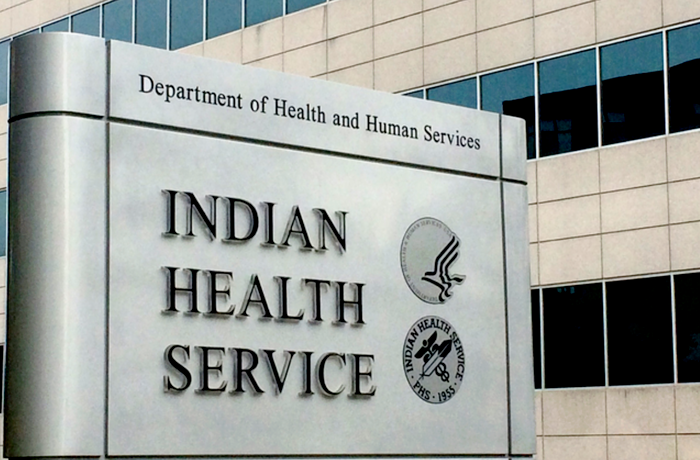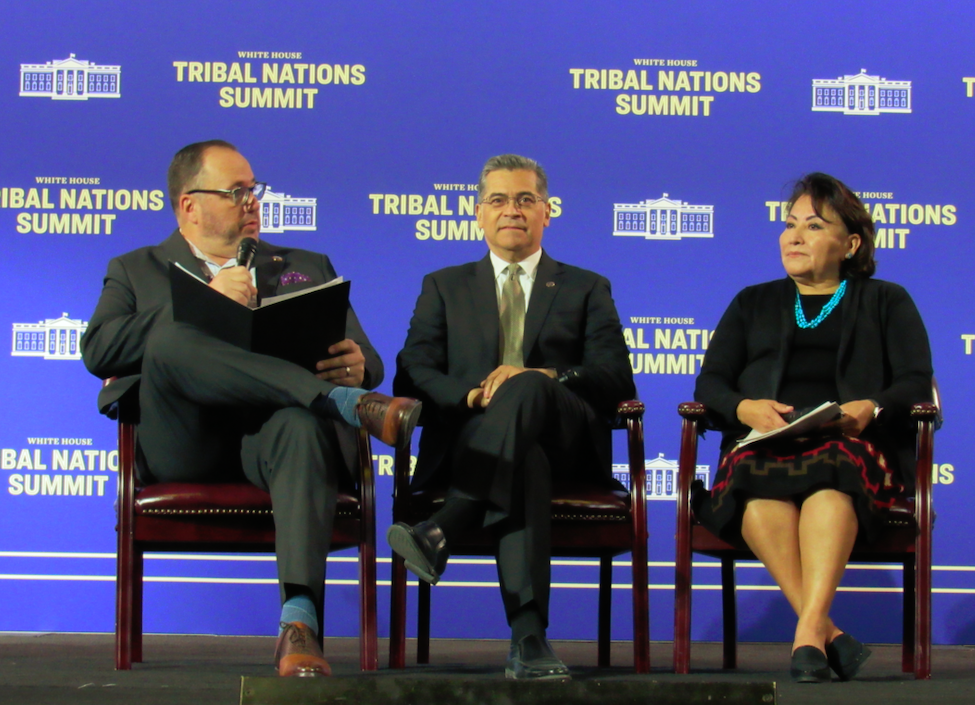
- Details
- By Levi Rickert
Opinion. The day before last week’s White House Tribal Nation Summit kicked off, the National Congress of American Indians (NCAI) and the National Indian Health Board (NIHB) held a meeting with several dozen tribal leaders from across Indian Country at the Capital Hilton. They met to prepare for high-level discussions with high-ranking Biden administration officials that would take place at the summit.
Outside the meeting room, a sign produced by the National Council of Urban Indian Health (NCUIH) read: “Native Lives Can’t Wait…It’s time for stable funding for the Indian Health Service.” The sign foretold a topic that would surface in discussions over the course of the next couple days when the summit convened on Wednesday and Thursday.
At issue is the fact there is no permanent federal funding for healthcare for Indian Country.
Even though the federal government has trust responsibilities to tribes, each year federal appropriations must be passed by Congress in the annual federal budget.
National Native American organizations and tribal leaders are calling on Congress to make funding for Indian Country healthcare mandatory or advance appropriations.
Advance appropriations would mean money would be appropriated for the next year or two without risk losing funding if there is a federal government shutdown.
Tribal leaders want to have advance appropriations like the Veterans Administration, Medicare and Medicaid.
“Every time the federal government shuts down — or Congress fails to pass an appropriations bill — our peoples’ health care suffers,” NIHB President Stacy A. Bohlen said to me outside the tribal leaders’ meeting.
NCUIH reports that during the last shutdown from 2018-2019, most urban Indian organizations had to cut services or close their doors entirely, forcing them to leave their patients — who are already vulnerable — without adequate healthcare. The unfortunate result for Native Americans is a lack of prescription drugs, unnecessary illnesses and even death.
On Thursday during the White House Tribal Summit, Penobscot Nation Chief Kirk Francis moderated a fireside chat with U.S. Department of Health and Human Services (HHS) Secretary Xavier Becerra and Indian Health Service (IHS) Director Roselyn Tso. Before he began interviewing the two federal officials, he talked about how unstable tribal health funding hit home for his tribe the last time there was a government shutdown.
“Delayed funding caused one of our citizens to not get the [medical attention] that she needed that would have identified life-threatening cancer at an earlier stage,” Francis said. “Another, only due to an emergent event, had her cardiology issue identified. It delays in being able to protect our citizen’s immediate inpatient substance abuse disorder treatments [that] can be the difference between life and death.”
Also on Thursday, over 120 groups, including urban Indian organizations came together to send letters to President Biden and congressional leadership that request support for the House-passed funding of $8.121 billion for the Indian Health Service for Fiscal Year (FY) 2023 and advance appropriations for FY 2024.

Penobscot Nation Chief Kirk Francis, U.S. Department of Health and Human Services (HHS) Secretary Xavier Becerra and Indian Health Service (IHS) Director Roselyn Tso.
Currently, there is bipartisan support for ensuring advance appropriations and ending budget interruptions for the Indian Health Service. Some 107 current members of Congress have expressed their support for advanced appropriations.
“IHS is the only major federal provider of healthcare that faces budget uncertainty. It's time for Congress to guarantee predictable funding and end this inequity,” Sen. Elizabeth Warren (D-MA) said.
Fortunately, President Joe Biden understands the need for mandatory funding for healthcare for Indian Country. On Wednesday, he reminded tribal leaders that his current budget included $9.1 billion in mandatory funding, an increase of $2.9 billion above 2021. After that, IHS funding would automatically grow to keep pace with healthcare costs and population growth and gradually close long standing service and facility shortfalls.
President Biden recognizes that bringing equity in healthcare funding to Indian Country is also a great need.
The latest available figures from the Government Accountability Office (GAO) finds that in 2017, per capita spending for IHS was $4,078. By comparison, the per capita spending was $13,185 for Medicare, $10,692 for the Veterans Health Administration, and $8,600 for federal prisoners.
That’s right: health spending for federal prisoners is two times the dollar amount allocated for Native Americans.
You can see there is more work for Congress to do to ensure Native Americans have access to quality healthcare. It’s time for Congress to approve advance appropriations for the Indian Health Service.
More Stories Like This
Colorado cannot heal until it confronts Sand Creek honestlyNative American Mothers Deserve to Live
Technology Rooted in Tradition is Strengthening Cherokee Nation
The Lumbee Tribe of North Carolina: #575
Tribes Do Not Need a Greenlight to Build Renewable Energy
Help us defend tribal sovereignty.
At Native News Online, our mission is rooted in telling the stories that strengthen sovereignty and uplift Indigenous voices — not just at year’s end, but every single day.
Because of your generosity last year, we were able to keep our reporters on the ground in tribal communities, at national gatherings and in the halls of Congress — covering the issues that matter most to Indian Country: sovereignty, culture, education, health and economic opportunity.
That support sustained us through a tough year in 2025. Now, as we look to the year ahead, we need your help right now to ensure warrior journalism remains strong — reporting that defends tribal sovereignty, amplifies Native truth, and holds power accountable.
 The stakes couldn't be higher. Your support keeps Native voices heard, Native stories told and Native sovereignty defended.
The stakes couldn't be higher. Your support keeps Native voices heard, Native stories told and Native sovereignty defended.
Stand with Warrior Journalism today.
Levi Rickert (Potawatomi), Editor & Publisher

